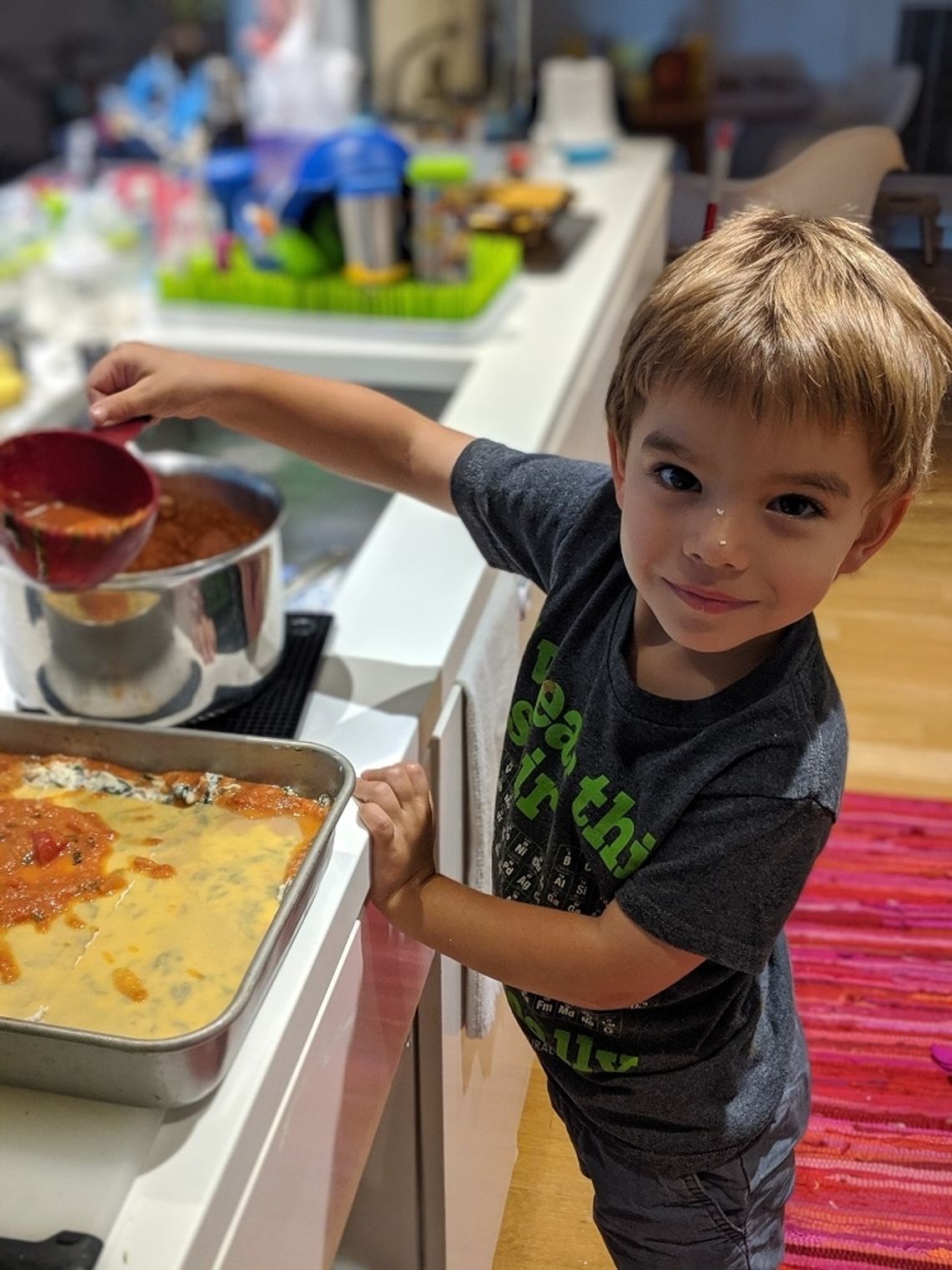Greetings Food Fans -- I am writing this missive in a bit of a rush before I head out to the airport to catch a flight to New York City. I can’t even begin to express how excited I am to: 1. Travel (period, dot); 2. Visit my younger sister and her husband (Erin & Brian); and 3. To snuggle my favorite little humans in the whole world. I have two nephews, one of whom is approaching two years old, who I haven’t seen in over 18 months--I CANNOT WAIT. . . When I arrive in New York, I don’t even have to quarantine--for that I am eternally grateful to the amazing staff at Churchill County for their vaccination program. So next week’s article is going to feature something that I cook with the kiddos--hopefully, featuring local seasonal produce from the Brooklyn farmers’ market.
For now, though, I want to talk about meatloaf. Did you know that the first reference to a loaf made of minced meat dates back to the Roman Empire in the 5th century? This is a dish that has existed for a LONG time. Historically, meatloaf is a dish prepared in Belgium, Germany, and Scandinavia--in the United States, its origins are rooted in “Scrapple” a mixture of ground pork and cornmeal that German American immigrants prepared in Pennsylvania as early as the revolutionary war.
Many families have a recipe for meatloaf with a couple of “secret” ingredients and techniques that are passed on from generation to generation. My scottish side used oatmeal in lieu of bread crumbs in their loaf (of course they also used lungs, stuffed it in a pig belly, and called it Haggis). In my husband’s family, they describe grandpa’s meatloaf as DRY--he served it with a baked potato also described as DRY. In my adult life, I have had a moderately challenging side-quest in search of the BEST meatloaf. And, I would contend, that I have completed this quest thanks to the experimentation of one of my favorite food writers, J. Kenji Alt-Lopez.
Kenji writes for a site called “Serious Eats.” He put himself through college (studying chemistry) as a line-cook. Ultimately, he decided to join his love of science with his love of cooking and build himself a perfect career. Kenji utilizes the scientific method to test recipes in order to identify the best possible iteration. The “perfect” recipes that result from his studies are sometimes a little complicated (involving extra steps to heighten taste and texture) but the results are worth it.
Kenji’s meatloaf incorporates lots of veggies, stock, white bread, pork, and beef. His “secret” ingredients are anchovies (for the flavor) and gelatin (for the texture). The resulting loaf is moist and tender--amazing fresh out of the oven with crispy caramelization on the outside and even better sliced the next day on a sandwich. The mixture is loose, so I would NOT recommend using this recipe as a substitute for meatballs--it definitely needs to be cooked in a pan, but Kenji has a trick for that too.
I truly hope you give this recipe a try. It might not have oatmeal or breadcrumbs and it is DEFINITELY NOT your grandpa’s dry loaf--but it would pair well with a baked potato.
All-American Meatloaf
Adapted from Kenji Alt-Lopez
Yield - one 9x5 loaf pan
INGREDIENTS:
½ c chicken stock
¼ c buttermilk
2 packets unflavored gelatin
2 slices white bread - crusts removed and torn in rough pieces
4 oz mushrooms
½ T anchovy paste - or 3 anchovy filets
1 T soy sauce
1 T smoked paprika
2 cloves garlic - chopped
1 small yellow onion, chopped
1 small carrot, peeled and chopped
1 stalk celery, chopped
2 T butter
1 lb ground pork
1 lb. ground beef
2 eggs
4 oz shredded cheese (cheddar or a mix)
¼ c minced parsley
Salt and pepper to taste
Glaze:
¾ c ketchup
¼ c light brown sugar - packed
½ c cider vinegar
½ t black pepper
INSTRUCTIONS:
1. Combine together the stock and butter
milk in a bowl. Sprinkle gelatin over the top
and set aside.
2. In a food processor, pulse the mushrooms
and the bread until finely chopped. Dump
into a large bowl and set aside.
3. In the food processor, combine anchovies
(or paste), soy sauce, paprika, and garlic.
Puree until a fine paste has formed. Add the
onion, carrots, and celery and pulse until
the veggies are finely chopped but not
pureed.
4. Heat the butter in a non-stick skillet
over medium-high heat until it is foamy.
Add the chopped vegetable mixture and
cook until softened, most of the liquid has
evaporated, and the mix is starting to dark-
en a bit. Add in the buttermilk/stock
mixture, bring to a simmer, and cook until
it is reduced by half (about 10 minutes).
Transfer the veggies into the bowl with
the mushroom and bread, stir thorough
-ly, and let sit until it is cool enough to han
-dle (about 10 minutes)
5. Add the pork and beef to the bowl, along
with the eggs, cheese, parsley, 1 T salt, and
1 t black pepper. With clean hands, mix
thoroughly until well combined. The mix
will be loose. To check seasoning go ahead
and taste a bit if you feel comfortable--al
-ternatively, scoop a teaspoon-sized portion
onto a microwave-safe plate and cook on
high for 15 seconds. Taste the cooked piece
for seasoning and add more salt/pepper if
desired.
6. Scoop the meat mix into a 9x5-inch loaf
pan. You will want to make sure that there
are not any trapped air bubbles at the bot
-tom of the pan. Cover the meatloaf with
a piece of aluminum foil that is large
enough to line a cookie sheet. Place the
meatloaf in the refrigerator and let chill
while your oven heats up. You can leave the
meatloaf in the fridge for up to two days
before cooking.
7. Preheat the oven to 350 degrees. When
the oven is hot, remove the meatloaf from
the fridge and without uncovering it, invert
the loaf pan onto a cookie sheet. Loosen the
foil and spread it out so the cookie sheet is l
-ined, leaving the loaf pan on top of the
meatloaf. You can fold the edges of the
aluminum foil up to trap the liquid that will
escape when the meatloaf cooks. Bake for
about 30 minutes.
8. Using a thin spatula or a butter knife,
gently lift the loaf pan jiggling a bit until
the meatloaf comes free. Use oven mitts
or a clean, dry towel to remove the loaf pan.
Return the meatloaf to the oven and bake
for another 40 minutes until the center of
the loaf is at least 140 degrees. Remove
from the oven and let rest for 15 minutes.
Turn the oven up to 500 degrees.
9. MEANWHILE, Make the Glaze. Com
-bine the ketchup, brown sugar, vinegar,
and pepper in a small saucepan and cook
over medium-high heat, whisking oc
-casionally, until the sugar is melted (about
2 minutes).
10. Use a brush to apply the glaze to the
meatloaf and return it to the 500 degree
oven for 5 minutes. Add more glaze and
bake for 5 more minutes. Remove from
oven and allow to rest for about 15 minutes.
Slice and serve with the extra glaze or mus
-tard and ketchup as you like.
Kelli Kelly - Slinger of Produce. Slurper of
Dumplings. Person of the Bean.








Comment
Comments